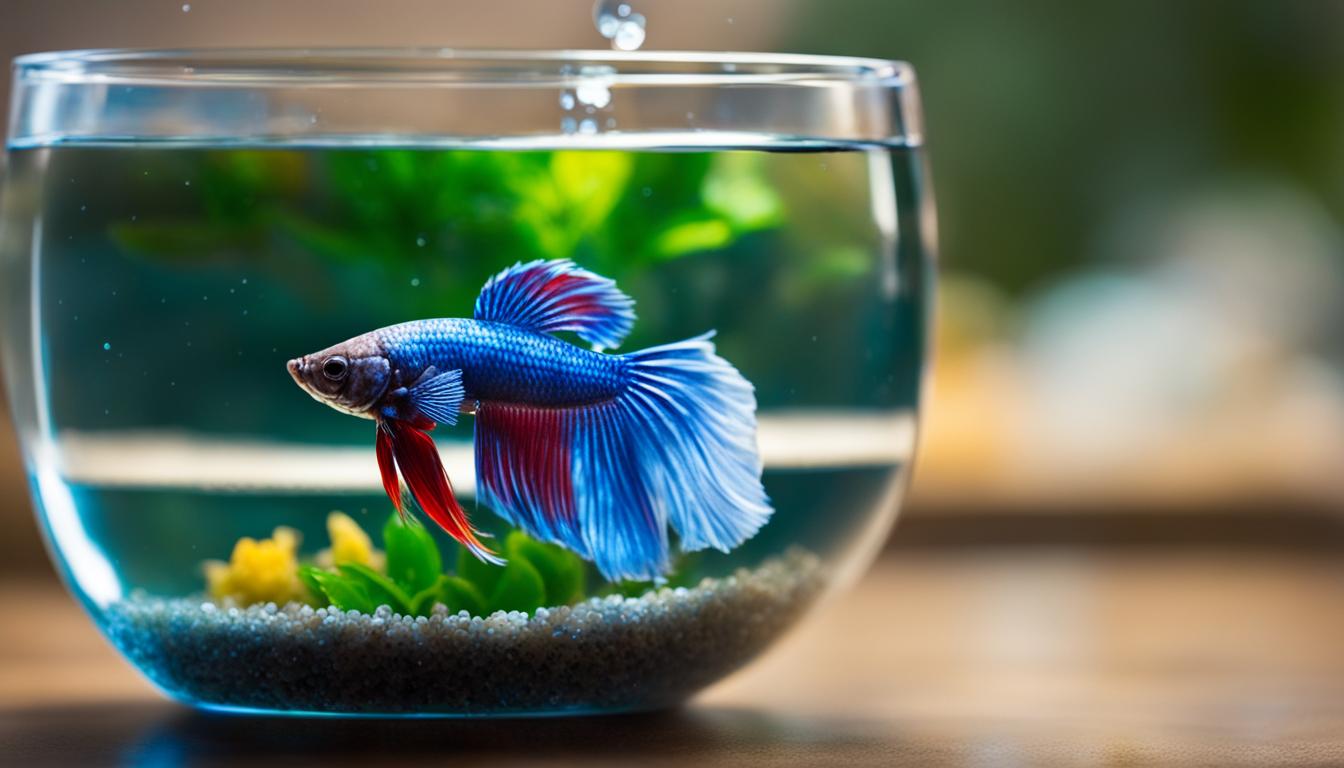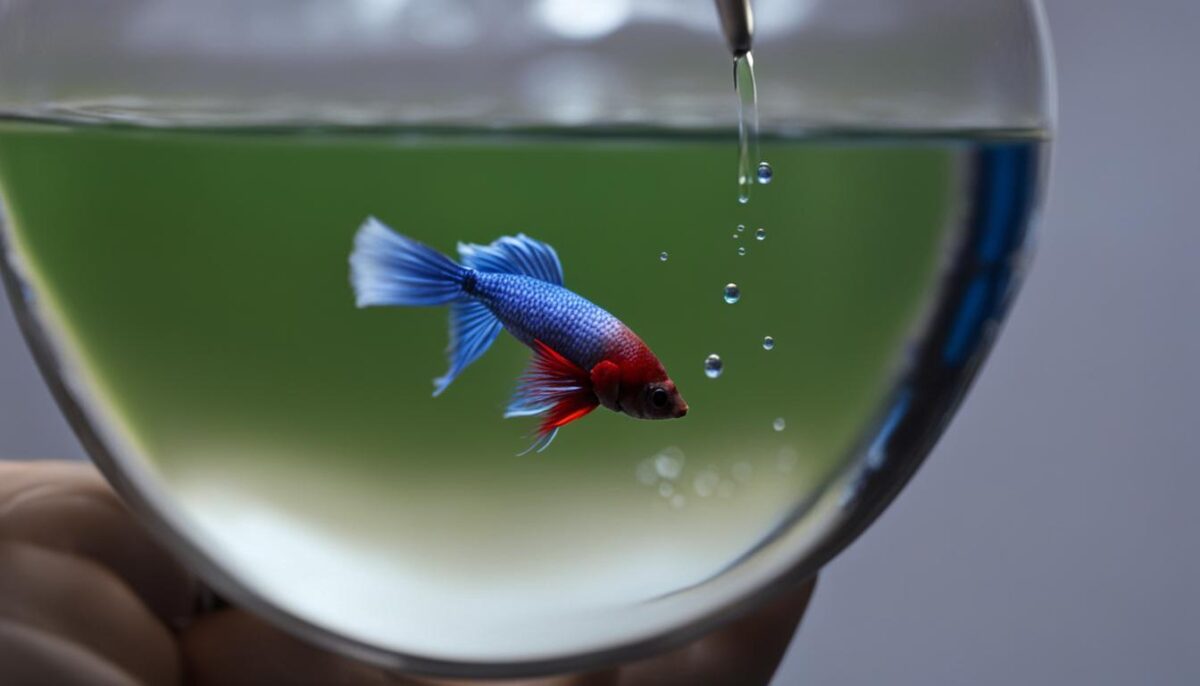Welcome to our comprehensive guide on how to treat tap water for betta fish! If you’re a betta fish owner, you may already know that tap water contains chemicals that can be harmful to your fish. This article will provide you with all the information you need to create a safe and healthy environment for your beloved bettas.
Key Takeaways
- Treating tap water is crucial for the health and well-being of your betta fish.
- Tap water contains chemicals like chlorine and chloramine that can harm your fish’s gills and internal organs.
- Using a de-chlorinator is the easiest and most effective way to treat tap water for bettas.
- Other methods of treating tap water include ultraviolet light, ascorbic acid, activated carbon, campden tablets, and home chloramine filters.
- Choose a water conditioner that works on both chlorine and chloramine to ensure thorough treatment.
Why Do You Need to Treat Tap Water?
Tap water treatment is crucial when it comes to creating a safe and healthy environment for your betta fish. Although tap water is treated by water treatment companies to make it safe for humans, it contains chemicals that can be harmful to fish.
When you fill your betta fish tank with untreated tap water, it may contain harmful chemicals such as chlorine and chloramine. These chemicals can be highly toxic to fish and have detrimental effects on their gills, internal organs, and overall health.
Not only can chlorine and chloramine harm your betta fish, but they can also kill beneficial bacteria in the tank. These bacteria play a critical role in maintaining a balanced ecosystem, regulating pH levels, and breaking down harmful substances within the water.
Furthermore, untreated tap water can affect the pH balance and salinity of the tank water, causing additional stress and discomfort for your betta fish.
By treating tap water before adding it to your betta fish tank, you can neutralize or remove these harmful chemicals and create an environment that promotes the well-being and longevity of your fish.
Proper tap water treatment ensures that your betta fish have clean, safe water to thrive in. It helps prevent health issues, supports a stable ecosystem, and reduces the risk of water-related problems in your aquarium.
How to Treat Tap Water For Betta Fish
When it comes to keeping your betta fish healthy and happy, treating tap water is an essential step. Tap water contains chemicals like chlorine and chloramine that can be harmful to your fish. Luckily, there are several water treatment methods available to make tap water safe for your betta fish.
The easiest and most effective way to treat tap water is by using a chemical de-chlorinator. One popular option is the API Tap Water Conditioner. This product works by neutralizing chlorine, chloramine, and other harmful chemicals in the water. It’s important to choose a de-chlorinator that also works on chloramine, as not all products do. Follow the instructions on the packaging to ensure proper dosage.
If you prefer alternative methods, there are other ways to treat tap water for betta fish. Ultraviolet light can be used to neutralize harmful substances in the water. Ascorbic acid and sodium ascorbate can also be effective in removing chlorine and chloramine. Activated carbon, campden tablets, and home chloramine filters are additional options to consider. Each method has its own advantages and disadvantages, so it’s crucial to choose the one that best suits your needs and the specific conditions of your tap water.
Once you’ve treated the tap water using your chosen method, you can safely add it to your betta fish tank. It’s important to monitor the water quality regularly and perform regular water changes to maintain a safe and healthy environment for your fish.
Image: Treat Tap Water for Betta Fish
| Treatment Method | Advantages | Disadvantages |
|---|---|---|
| Chemical De-chlorinator | Effectively neutralizes chlorine and chloramine | Some products may not work on chloramine |
| Ultraviolet Light | Neutralizes harmful substances | Requires additional equipment |
| Ascorbic Acid and Sodium Ascorbate | Removes chlorine and chloramine | Must be used in correct proportions |
| Activated Carbon | Filters out impurities | Needs regular replacement |
| Campden Tablets | Neutralizes chlorine and chloramine | Can affect water pH levels |
| Home Chloramine Filters | Removes chlorine and chloramine | Requires installation and maintenance |
Conclusion
Treating tap water is crucial for the care and well-being of your betta fish. Untreated tap water contains harmful chemicals like chlorine and chloramine that can be toxic to your fish. These chemicals can cause damage to their gills, internal organs, and overall health. By using a water conditioner or other treatment methods, you can neutralize or remove these harmful chemicals, creating a safe environment for your betta fish.
When selecting a water conditioner, make sure it’s designed to work on both chlorine and chloramine. Follow the instructions provided on the product to properly treat tap water before adding it to your fish tank. With regular tap water treatment and routine water changes, you can ensure that your betta fish thrives and lives a healthy life in their aquarium.
Remember, tap water treatment is an essential part of betta fish care. It helps create an optimal and safe living environment for your fish, promoting their well-being and longevity. Take the necessary steps to treat your tap water and provide your betta fish with the best possible care.
FAQ
Why is it important to treat tap water for betta fish?
Tap water contains chemicals that are toxic to betta fish, such as chlorine and chloramine. These chemicals can harm the fish’s gills and internal organs, leading to poor water quality and a toxic environment. Treating tap water is necessary to remove or neutralize these harmful chemicals and ensure a safe and healthy environment for the fish.
How do harmful chemicals in tap water affect betta fish?
The chemicals found in tap water, such as chlorine and chloramine, are highly toxic to fish and can harm their gills, internal organs, and overall health. These chemicals can also kill the beneficial bacteria in the tank and affect the pH levels and salinity of the water. Treating tap water is essential to protect the health and well-being of betta fish.
What methods can be used to treat tap water for betta fish?
There are several methods to treat tap water and make it safe for betta fish. The easiest and most effective method is to use a chemical de-chlorinator, such as API Tap Water Conditioner, which neutralizes chlorine, chloramine, and other chemicals in the water. Other methods include using ultraviolet light, ascorbic acid and sodium ascorbate, activated carbon, campden tablets, or home chloramine filters. It is important to choose the method that best suits your needs and the specific conditions of your tap water.
How should tap water be treated before adding it to a betta fish tank?
To treat tap water for betta fish, you can use a water conditioner or other treatment methods. It is important to choose a water conditioner that works on both chlorine and chloramine and to follow the instructions for treating tap water. The water should be treated to neutralize or remove the harmful chemicals before adding it to the fish tank. Regular water changes and proper tap water treatment are essential for the health and well-being of betta fish.

